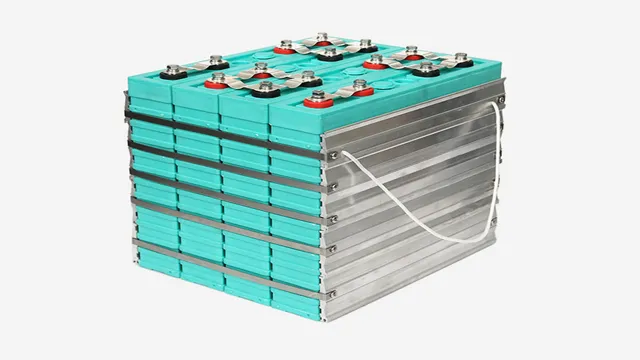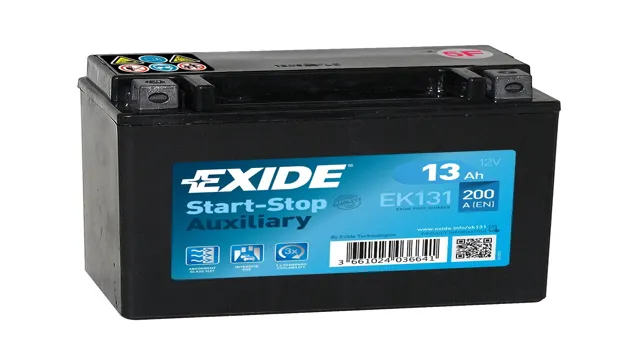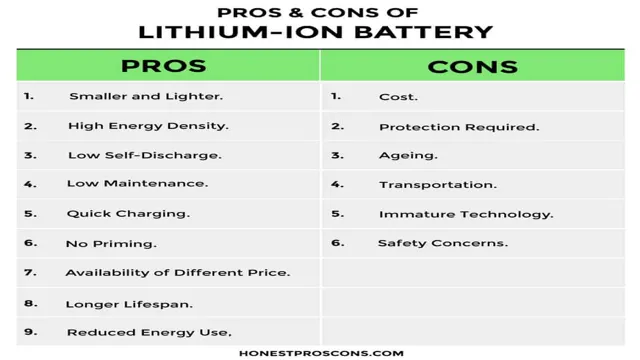Revolutionizing the Automotive Industry: Exploring the Benefits and Challenges of Electric Car Battery Imports
Electric cars have been around for a while now, and they are no longer seen as a novel concept. They are a convenient, environmentally friendly and cost-effective alternative to petrol and diesel cars that still dominate the market. However, one of the critical components that make electric cars possible is their batteries.
Unfortunately, these batteries are not made locally, and importing them can be a daunting and complicated process. If you’re a car manufacturer or an individual who wants to import electric car batteries, you might be wondering what to expect. There are many factors to consider before shipping these batteries, from the legalities involved to logistics and shipping requirements.
Importing electric car batteries also requires close attention to the battery’s specific characteristics, such as its voltage and chemical composition, to ensure that it meets local safety standards. Despite the complexities involved, importing electric car batteries might be the best option for car manufacturers and individuals looking to switch to electric cars. The batteries are reliable, efficient and can provide a long lifespan of up to 10 years.
Plus, the cost of electric car batteries has significantly reduced over the years, making them more accessible to many people. In this blog post, we’ll explore the various aspects that come with importing electric car batteries. We’ll take an in-depth look at the legal requirements, logistics, and risks involved in the process.
We’ll also explore the benefits of importing batteries, discuss cost implications, and offer some practical tips for importing electric car batteries. So let’s dive right in and explore the world of importing electric car batteries!
Why Import Electric Car Batteries?
One of the main reasons for importing electric car batteries is due to the high demand for electric vehicles. As sales continue to increase, there is a surge in the need for batteries that can provide high levels of energy density, increased durability, and longer lifespan. Additionally, importing batteries allows for access to a wider range of batteries, which can be tailored to meet the needs of different car models.
International trade also enables reduction in production costs, which translates into more affordable electric cars for consumers. Furthermore, some countries have preferential trade agreements with others that grant access to cheaper and more efficient batteries. All in all, importing electric car batteries is a practical choice to meet the demands of the electric car market and make sustainable transportation accessible to the masses.
Cost Savings
Electric car batteries are essential for the functioning of electric vehicles. Importing electric car batteries can lead to significant cost savings for manufacturers. The cost of manufacturing electric car batteries can be high due to the need for specialized equipment and materials.
Outsourcing the production of batteries can lead to reduced costs for manufacturers. Additionally, sourcing batteries from countries where labor and material costs are lower can also lead to cost savings. This allows for the manufacturer to lower the cost of electric vehicles and make them more accessible to consumers.
Incorporating imported batteries into electric vehicles can also improve their reliability and performance. Batteries imported from countries with advanced manufacturing industries may offer advanced technology and innovative features. By importing batteries from other countries, manufacturers are able to access technology that is not available domestically.
This technology can then be used to improve the performance and reliability of electric vehicles. Overall, importing electric car batteries can lead to significant cost savings and improved performance for manufacturers. By taking advantage of lower labor and material costs in other countries, manufacturers can lower the cost of electric vehicles and make them more accessible to consumers.
The incorporation of advanced technology from other countries can also lead to further improvements in the performance of electric vehicles. Therefore, importing electric car batteries is a practical and beneficial option for manufacturers.
Specialization and Customization
As the electric car industry continues to grow, there has been an increasing demand for specialized batteries. This is where the importance of importing electric car batteries comes into play. Different electric car brands require different types of batteries, and importing allows for customization and optimization.
By importing, car manufacturers can choose batteries that fit their specific needs and ensure efficiency and longevity. Specialization and customization are crucial factors in the success of any industry, and the electric car industry is no exception. By importing batteries, car manufacturers can ensure that their products are at the forefront of innovation and remain competitive in the market.
Moreover, importing batteries from countries with more competitive prices and higher-quality products can also have financial advantages for car manufacturers. Ultimately, importing electric car batteries benefits both car manufacturers and consumers alike by ensuring the efficiency and durability of electric vehicles.
Considerations When Importing Electric Car Batteries
Electric car battery importation requires careful consideration of various factors to ensure a smooth and successful process. One of the first things importers need to do is to ensure that the electric car batteries comply with relevant safety and environmental regulations in their country. Importers should also be aware of the documentation requirements, such as shipping documents, customs declarations, taxes, and duties.
Additionally, they need to consider the transportation logistics, including the mode of transportation, packaging requirements, and handling procedures to ensure the batteries arrive in good condition. It is also important to work with reputable suppliers who can provide high-quality batteries that meet the required specifications. Importers must consider all these factors to ensure a seamless and cost-effective electric car battery importation process.
International Regulations
When it comes to importing electric car batteries, there are a few important regulations that need to be considered. First and foremost, it is crucial to ensure that the batteries meet the specific safety standards set by both the exporting and importing countries. This includes meeting requirements for shipping, handling, and disposal of the batteries.
Additionally, there may be restrictions on the transportation of hazardous materials, which could impact the shipping methods used for the batteries. Another important consideration is the documentation required for importing batteries, including customs documentation and certifications of compliance with relevant regulations. Overall, it is essential to work closely with experts in the field to navigate the complex regulations surrounding the import of electric car batteries and ensure compliance with all applicable laws and standards.
Quality Control
When importing electric car batteries, quality control is paramount. You want to ensure that the batteries you receive are up to the high standards needed for safe and efficient use in the vehicles you are providing. One aspect to consider is the reputation of the manufacturer.
Look for a company that has a track record of producing successful and reliable batteries. Additionally, the battery should undergo rigorous testing before it is shipped. This includes individual cell testing, as well as overall performance and safety checks.
It is also important to make sure all necessary certifications and regulations are met. By taking these factors into account, you can ensure that the electric car batteries you import are of the highest quality and will perform as expected.
Shipping and Logistics
Electric car batteries are becoming more popular as people transition to eco-friendly modes of transportation. However, importing these batteries requires careful consideration to ensure the safe and legal transport of the products. One major concern is the potential for batteries to be classified as hazardous materials by shipping and airline regulations.
Proper labeling and documentation are crucial to avoid any delays or difficulties in shipping. Additionally, it is important to verify that the supplier and manufacturer comply with international standards for battery production and safety. This includes testing the batteries for safety and ensuring they are compatible with the transportation methods being used.
Overall, importing electric car batteries requires attention to detail and adherence to safety regulations to ensure a smooth and successful shipment.
Finding the Right Supplier
Importing an electric car battery can be a challenge, especially when it comes to finding the right supplier. Before you even start looking, it’s important to determine your needs and budget. Do you need a specific type of battery or a certain quantity? Can you afford to pay for shipping and customs fees? With these questions in mind, you can start your search for a reliable supplier.
Look for companies with a proven track record and positive reviews. Check if they offer warranties and customer support. Ask for samples and test them to ensure they meet your requirements.
It’s also important to consider the supplier’s location and communication skills. Will they be able to deliver on time and provide updates on the shipping process? Once you find a supplier that ticks all the right boxes, you can rest easy knowing that your electric car battery import is in good hands.
Researching Potential Suppliers
When it comes to finding the right supplier, the first step is researching potential suppliers. You want to find a supplier who meets your specific needs and can provide the products or services you require at a reasonable price. Start by looking at online directories such as Alibaba or ThomasNet.
Attend trade shows and industry events to meet potential suppliers in person. Check references and ask for samples to help you evaluate the quality of their products. Don’t be afraid to ask questions and negotiate terms to find the best fit for your business.
A good supplier should be reliable, responsive to your needs, and committed to providing excellent customer service. By taking the time to research potential suppliers, you can find the right partner to help your business succeed.
Evaluating Product Quality
When it comes to evaluating product quality, finding the right supplier is crucial. After all, you want to partner with a supplier who can consistently provide high-quality products that meet your standards. So, where do you start? One approach is to research potential suppliers online and read reviews from other businesses that have worked with them in the past.
You can also request samples of their products to evaluate for quality. But perhaps the most effective strategy is to have a conversation with the supplier and ask them about their quality control processes. This can give you a better understanding of how they ensure their products meet the highest standards.
Remember, the quality of your products depends on the quality of your supplier. So take the time to find the right one that fits your needs and standards.
Conclusion
In the world of electric vehicles, the battery truly reigns supreme. As high demand for these powerful energy sources continues to grow, the importation of electric car batteries has become an increasingly important factor in the industry. Whether it’s the latest innovation or a tried-and-true classic, these batteries hold the key to unlocking the full potential of electric vehicles.
So when it comes to powering your ride, be sure to choose a battery that’s truly charged up and ready to go – after all, your journey is only as good as the energy that drives it!”
FAQs
What is the current trend in the import of electric car batteries?
The current trend in the import of electric car batteries is a steady increase due to the rise in demand for electric vehicles.
Why do countries import electric car batteries instead of producing them locally?
Countries import electric car batteries because it can be more cost-effective to do so and can result in a larger variety of battery options for consumers to choose from.
Are there any restrictions on the import of electric car batteries?
Yes, there may be restrictions on the import of electric car batteries based on the country’s regulations and environmental policies.
How do imported electric car batteries impact the environment?
The environmental impact of imported electric car batteries depends on the production process and the source of the battery. Some batteries have a lower carbon footprint than others and may be more eco-friendly.





